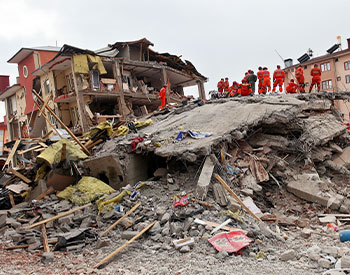
Search and rescue forces search through a destroyed building
Earthquake
Before an Earthquake
Secure water heater, storage shelves, heavy mirrors, shelves, etc. to walls.Know where and how to shut off utilities of electricity, gas, water (main valves, switches, etc.)
Have earthquake drills and identify safe spots in each room
Have an out-of-state contact person.
Develop a plan for reuniting family members after the earthquake.
Review your insurance policies.
Keep a good pair of shoes and a flashlight near your bed
Prepare to survive on your own for at least three days
During an Earthquake
Stay calm.If inside, stay inside and find protection in a doorway, or crouch under a desk or table, away from windows, glass, brick walls and chimneys.
If outside, stand away from buildings, trees, telephones, and electric lines.
If on the road, drive away from under passes or over passes: stop in a safe area: stay in your vehicle.
If in an office building, stay next to a pillar or column, or under a heavy table or desk.
Stay where you are until the shaking has stopped and you are sure it is safe to move.
After an Earthquake
Check for injuries and provide first aid.Check for fires; gad, water, sewage beaks; downed electric lines; building damage and potential problems from aftershocks, such ad cracked around the fireplace and foundation. Turn on interrupted utilities as necessary.
Clean up dangerous spills.
Wear shoes and leather gloves.
Tune radio to an emergency station and listen from public emergency broadcast announcements.
Use the telephone only for emergencies.
As soon as possible, notify family that you are safe.
Do not use matches or open flames until you are sure there are not any has leaks as a result of impacts from the shock(s).
Do not turn light on and off, creating sparks and ignition sources for gas leaks.
In public buildings. Follow evacuation procedures immediately and return after the building had been declared safe by the appropriate authorities.
